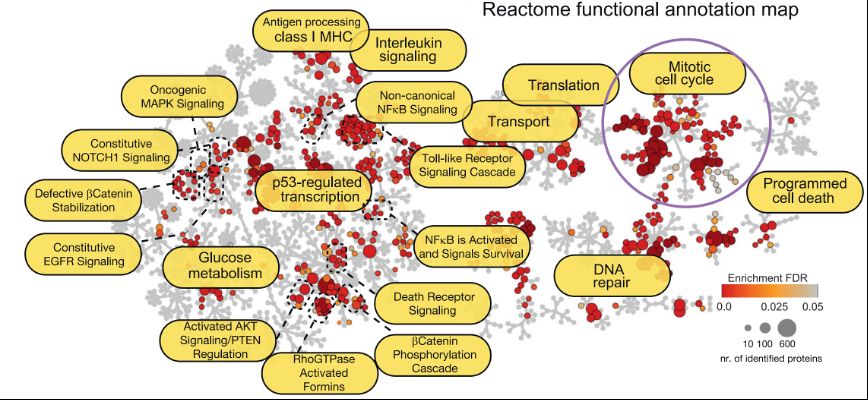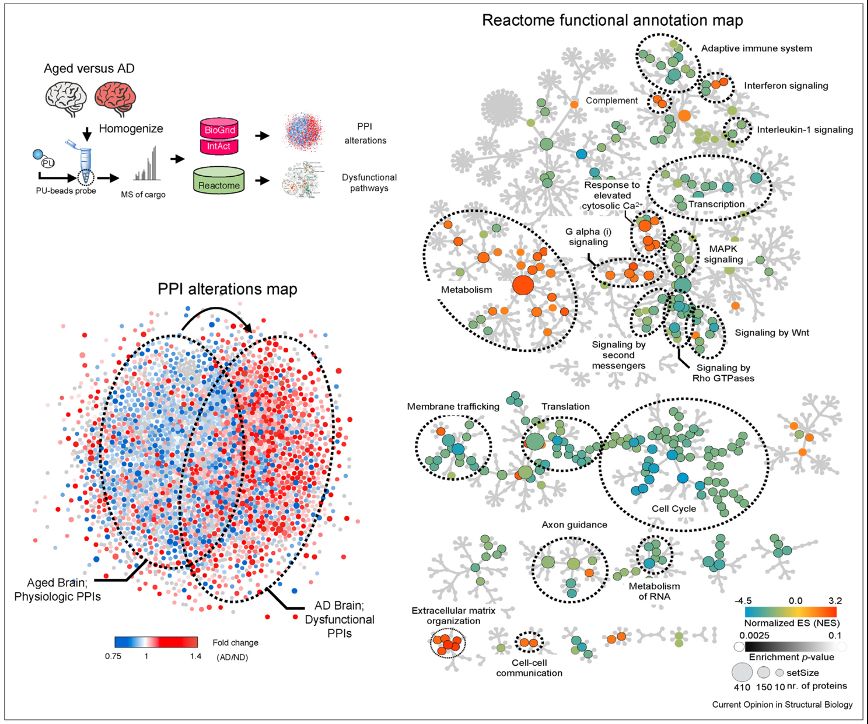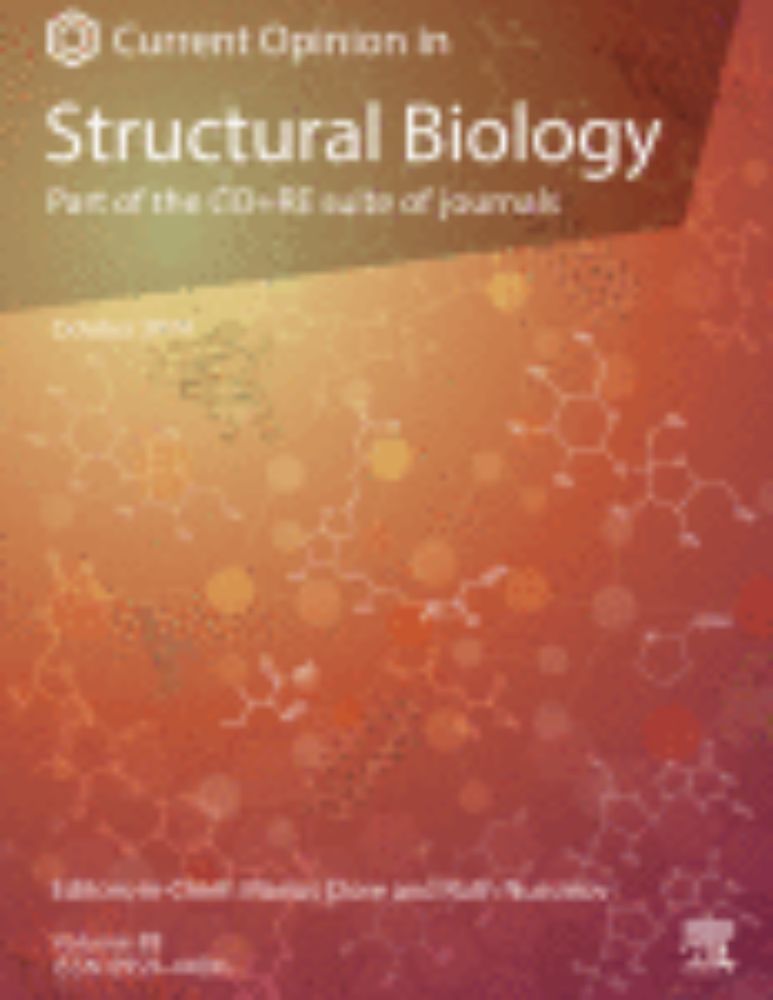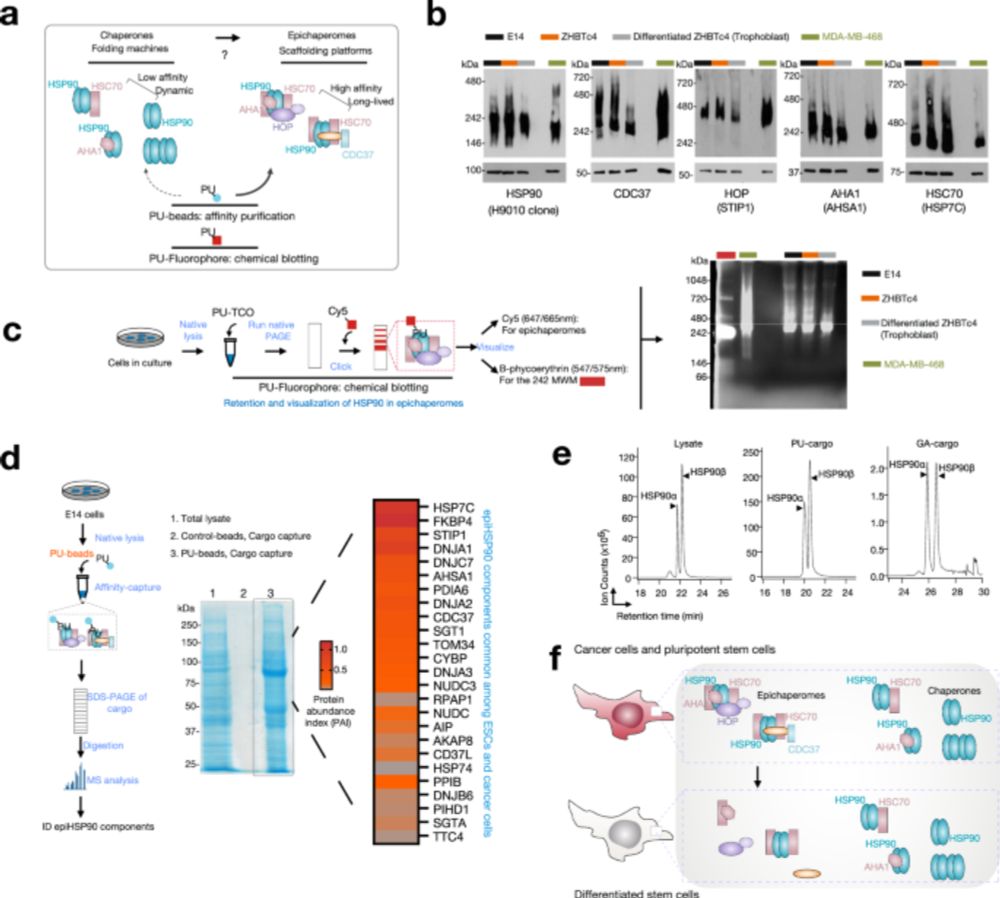
'Epichaperome Remodeling Defines Layer- and Cell-Type-Specific Vulnerability in the Prefrontal Cortex of Alzheimer's Disease Brains' by Sadik Bay at #SfN25. What a great poster session to close out an exciting week of science discussion!
#epichaperomics #Alzheimers #omics #neuroscience #therapeutics
24.11.2025 18:15 — 👍 0 🔁 0 💬 0 📌 0


'Mapping Epichaperome-Driven Network Dysfunctions in Alzheimer’s Disease Using Dysfunctional Protein-Protein Interactome Analysis' presented by Dr. Anna Rodina at #SfN25!
🤓🧠
Thank you to everyone engaged with our work & Anna for giving a superb presentation!
#dfPPI #epichaperome #alzheimers #omics
24.11.2025 18:09 — 👍 0 🔁 0 💬 0 📌 0

PTMs as molecular encoders: reprogramming chaperones into epichaperomes for network control in disease
Recent discoveries reveal that post-translational modifications (PTMs) do more than regulate protein activity – they encode conformational states that…
🚨Publication alert! The final version of our cover feature article is OUT NOW in @cp-trendsbiochem.bsky.social
Read how we connect the #epichaperome with the #chaperone code.
#PTMs #HSP90 #PPI #neuroscience #NetworkBiology
Check out the review article here: www.sciencedirect.com/science/arti...
14.10.2025 16:56 — 👍 4 🔁 1 💬 0 📌 0
When Modifications Rewrite Networks: How PTMs Reprogram Chaperones into Epichaperomes
Dive deeper into our @cp-trendsbiochem.bsky.social cover article! Read more on @springernature.com Communities:
communities.springernature.com/posts/when-m...
#Epichaperome #PTMs #NetworkBiology #SystemsBiology #TrendsBiochem #NatureCommunities
10.10.2025 14:51 — 👍 3 🔁 1 💬 0 📌 0


📸Check out a few photos from @gabrielachiosis.bsky.social and Tanaya's talks at #CSSI2025 @stresscell.bsky.social l last weekend.
#epichaperome #cellularstress #HSP90 #Alzheimers
10.10.2025 14:48 — 👍 2 🔁 1 💬 0 📌 0

📢 Our October issue is now online. Access the full issue 👉 www.cell.com/trends/bioch....
🎨 The cover highlights a Review from @chiosislabmskcc.bsky.social and co on how PTMs reprogram chaperones into epichaperomes.
06.10.2025 14:40 — 👍 7 🔁 4 💬 1 📌 1

PTMs as molecular encoders: reprogramming chaperones into epichaperomes for network control in disease
Recent discoveries reveal that post-translational modifications (PTMs) do more than regulate protein activity – they encode conformational states that…
💡Have you checked out our latest review in @cp-trendsbiochem.bsky.social? Discover how post-translational modifications can convert molecular chaperones into #epichaperomes – stable scaffolds that restructure protein–protein interaction networks in disease #PPI
www.sciencedirect.com/science/arti...
09.09.2025 15:44 — 👍 5 🔁 1 💬 0 📌 0
Out now in @cp-trendsbiochem.bsky.social: "PTMs as Molecular Encoders: Reprogramming Chaperones into Epichaperomes for Network Control in Disease" from @chiosislabmskcc.bsky.social. Learn more ⬇️
04.09.2025 17:36 — 👍 4 🔁 2 💬 0 📌 0
Redirecting
🌟Very excited to share that our article 'PTMs as Molecular Encoders: Reprogramming Chaperones into Epichaperomes for Network Control in Disease' is out online now in @cp-trendsbiochem.bsky.social
#PTMs #HSP90 #epichaperome #PPI #neuroscience @mskcancercenter.bsky.social
doi.org/10.1016/j.ti...
03.09.2025 13:34 — 👍 4 🔁 1 💬 0 📌 0

📝 Online now - the Review "PTMs as molecular encoders: reprogramming chaperones into epichaperomes for network control in disease" from @chiosislabmskcc.bsky.social et al.
#ProteinProteinInteractions #ProteinNetworks #ChaperoneReprogramming
Read it here 👉 authors.elsevier.com/sd/article/S...
28.08.2025 13:36 — 👍 4 🔁 1 💬 0 📌 1

Sahil presented earlier this month at #AAIC2025 in Toronto @alzassociation.bsky.social
This work was supported by BrightFocus & NIH Aging and aims to advance #precisionmedicine in #neurodegeneration through the development of small molecule probes for #epichaperome imaging in #Alzheimers.
14.08.2025 18:33 — 👍 2 🔁 1 💬 0 📌 0
In #cancer, Casein Kinase 2 (CK2) interacts with #HSP90 and puts phosphate groups on Serine 255 and Serine 226 positions of the charged linker region of HSP90 thereby changing its structure or conformation. This dangerous alter ego of HSP90 helps the cancer cells to survive. (7)
#phosphorylation
07.05.2025 18:45 — 👍 1 🔁 1 💬 1 📌 0
This switch of HSP90 to "bad" and the formation of the epichaperome makes it so the #epichaperome now aids #cancer. (6)
07.05.2025 18:45 — 👍 0 🔁 0 💬 1 📌 0
#Cancer is a multifactorial disease that manifests as a result of chronic cellular stress, a trigger that turns #HSP90 into Mr. Hyde.
Mr. Hyde can now associate with other chaperone protein members and form a gang (high molecular weight assembly) called “epichaperome”. (5)
#epichaperome
07.05.2025 18:45 — 👍 0 🔁 0 💬 1 📌 0
In our latest work, now published in
@natcomms.nature.com, we uncover how #HSP90 switches from “good” to “bad” in #cancer. (4)
07.05.2025 18:45 — 👍 1 🔁 0 💬 1 📌 0
Heat Shock Protein 90 (HSP90) is a cellular chaperone protein ubiquitously present in human body and is responsible for folding other important proteins in the cell. However, it can exist either as Dr. Jekyll or Mr. Hyde depending on how stressed the cells are. (3) #cellstress #HSP90
07.05.2025 18:45 — 👍 0 🔁 0 💬 1 📌 0
Any protein consists of strings of amino acids that fold into distinct different shapes and structures inside the cell depending on the cellular environment. (2)
#proteinstructure #HSP90 #chaperone #cancer #chembio
07.05.2025 18:45 — 👍 0 🔁 0 💬 1 📌 0
🚀 Integrating dfPPI with other omics could reveal comprehensive disease mechanisms, paving the way for groundbreaking discoveries and precision therapeutics across numerous diseases. #MultiOmics #FutureResearch (11/11)
25.04.2025 15:11 — 👍 1 🔁 1 💬 0 📌 0
🌐 The open-access dfPPI Platform lets researchers worldwide visualize and analyze dfPPI data interactively, empowering researchers with access to cutting-edge proteomics analysis. #OpenScience #Proteomics
25.04.2025 15:11 — 👍 1 🔁 1 💬 1 📌 0

⚕️dfPPI help identify a hyperconnectivity state—an increased level of protein interactions in tumors, where cells become highly sensitive to therapies enhancing their effectiveness. #PrecisionMedicine #CancerTherapy
25.04.2025 15:11 — 👍 0 🔁 0 💬 1 📌 0

🔗 Protein connectivity changes detected by dfPPI show minimal correlation with overall protein expression—demonstrating the need to look beyond protein levels to understand true disease biology. #Proteomics #dfPPI
25.04.2025 15:11 — 👍 0 🔁 0 💬 1 📌 0

🎗️In cancer cells, dfPPI identifies dysfunctional PPIs critical for malignant behavior—offering insights into novel therapeutic vulnerabilities like mitotic network disruptions. #CancerResearch #Therapeutics
25.04.2025 15:11 — 👍 0 🔁 0 💬 1 📌 0

🧠 In Alzheimer’s research, dfPPI unveiled significant changes in protein connectivity, with extensive losses and gains of interactions, highlighting disrupted pathways crucial for memory. #Alzheimers #Neurodegeneration
25.04.2025 15:11 — 👍 0 🔁 0 💬 1 📌 0
🖥️ New bioinformatics pipelines now make dfPPI data analytics user-friendly, aiding scientists to map disease-specific protein interactions and pathways without specialized training. #DataScience #Bioinformatics
25.04.2025 15:11 — 👍 0 🔁 0 💬 1 📌 0
Bringing Proteoforms to Life (sm)
Our Mission is to promote collaboration, education, and innovative research that will accelerate the comprehensive analysis of all human proteoforms. ctdp.org
The official Bluesky account for the Department of Medical Physics https://www.mskcc.org/departments/medical-physics
The Cell Stress Society International, Inc. is a non-profit scientific society open to any qualified researcher investigating stress responses.
https://cellstressresponses.org/
Discovering immune mechanisms to combat disease, enhance vaccines, and control autoimmunity | Training the next generation of immunologists | immunology.pitt.edu/
View our starter pack: https://go.bsky.app/oMSpbG
Michael Sattler's Lab @TU_Muenchen & @HelmholtzMunich
We use NMR 🧲 integrated with other techniques to study proteins, RNA & their interactions
Website: https://www.sattlerlab.de//
Reproductive Scientist. Saskatoon, Saskatchewan, Canada. Opinions my own. Also on Mastodon: @dmacphee@mas.to
Assistant Professor at Uniformed Services University studying cellular stress signaling. Views = own.
Postdoctoral Researcher at SUNY Upstate Medical studying kidney cancer. Addicted to crafts, cats, and coffee.
Professor of Urology, Biochemistry & Molecular Biology,
Upstate Medical University, State University of New York.
www.mollapourlab.com
President- Cell Stress Society International
https://cellstressresponses.org/
Assistant Professor of Biophysics | Center for Alzheimer's and Neurodegenerative Diseases (CAND), UT Southwestern Medical Center (UTSW) | Protein misfolding / Amyloid formation / Neurodegenerative diseases 🧠 / AI/ML protein engineering | 🇬🇷/🇬🇧
I use robots and biophysics to study cancer therapies in the Chodera Lab at Memorial Sloan Kettering Cancer Center. Views are my own.
TIBS is celebrating its 50th anniversary in 2026 - join in the fun and share your ideas with us!
To learn more, visit: https://www.cell.com/trends/biochemical-sciences/anniversary
Managed by editor @sanniejculbertson.bsky.social
Medical Library of @mskcancercenter.bsky.social
- Tweets and posts are written by library staff and reflect their personal opinions not necessarily those of MSK.
Physician Scientist at MSK. All views expressed here are my own & do not represent my employer. COI:http://bit.ly/2LQCLKe
We study how micro-environmental and epigenetic mechanisms drive cancer cells into dormancy. We seek to control this biology to prevent and treat metastasis. https://einsteinmed.edu/faculty/16974/julio-aguirre-ghiso
A gold open-access journal focused on innovative chemical biology tools and their application in exploring and manipulating molecular biological processes.
🌐 Website: rsc.li/rscchembio Published by @rsc.org
Neuroscientist | Asst. Prof at @University of Toronto 🌸 PhD in biomarkers for Alzheimer's disease and cerebral Small vessel disease
Behavioral neurologist and AI director working to end degeneration of mental function and use technology to transform the practice of neurology.
Neuro AI Program (NAIP)
https://naip.mayo.edu
https://www.youtube.com/channel/UCj9q9jnuNZNNZnx48-P1vkg















